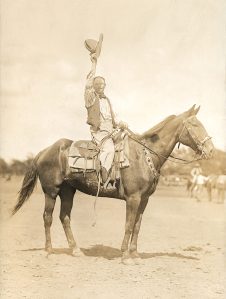We Shall Remain: America Through Native Eyes
5 episodes/3 DVDs approx. 7½ hours
This American counter-epic can be as disorienting as Alice’s fall down the rabbit hole—and that is its central virtue. The latest American Experience entry from PBS displays the usual quality production hallmarks, including faithful attention to historical detail and a well scripted narration, here delivered by Quechua Indian Benjamin Bratt. But as it tracks five pivotal moments in American Indian history, the miniseries relies more on staged docudrama than on aged stills plus talking heads. And it works. While affecting vistas conjure the vast wilder ness, striking color continuity, soft-focus shots and bouts of graininess in the reenactments create a complex, suggestive realism. “After The Mayflower” sees New England’s first half century through Massasoit, a Wampanoag chief whose self-interested befriending of the struggling colonists helped them survive and created a brief, bittersweet inter dependence of white and Indian cultures. “Tecumseh’s Vision” follows the Shawnee chief and his brother Tenskwatawa (The Prophet), whose visions kindled a spiritual revival that Tecumseh harnessed with the aim of creating a tribal confederacy and preserving the Old Northwest as an independent Indian nation. “Trail of Tears” is rife with irony: To prove to whites they were not savages, Cherokee leaders established a European-style republic, and many became Christians—though that and a Supreme Court victory about tribal sovereignty didn’t deter Andrew Jackson’s iron will to “remove” them. “Geronimo” looks at the warrior and healer whose tribe was forced onto an Arizona reservation, where his relentless raids made his name a byword for evil among whites, and divided his tribe between supporters and those who saw him as the bloodthirsty cause of white oppression. Finally, “Wounded Knee” fast-forwards to 1973: For 71 days, 200 Oglala Lakota and American Indian Movement activists took over the town in famous for a century-old Indian massacre, issued demands and galvanized a new cultural reawakening. Yes, there are a few inevitable preachy bits. But We Shall Remain is a powerful achievement: a compelling mirror history few Americans know.
Originally published in the June 2009 issue of American History. To subscribe, click here.




